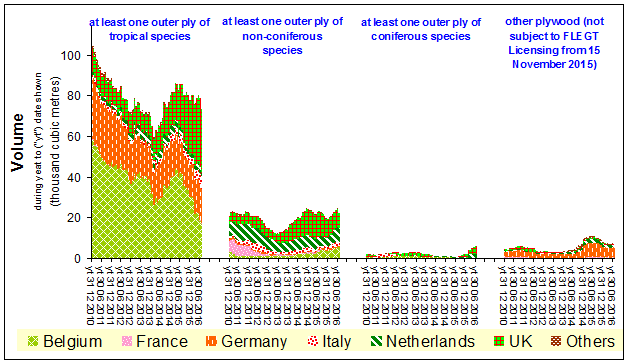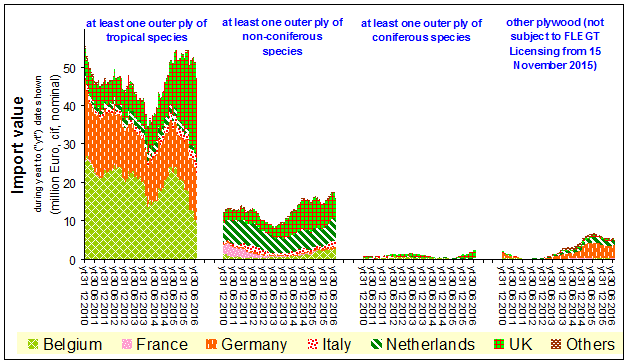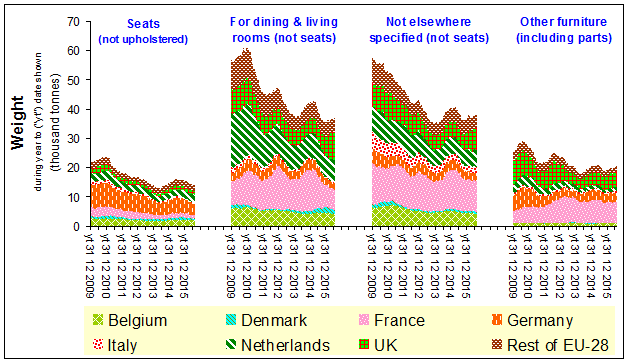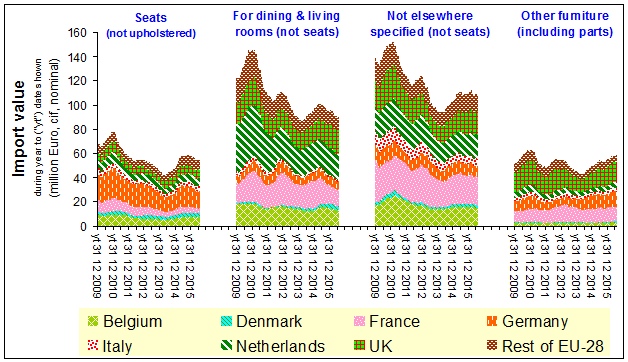|
|
|
Contrary to remarks[-] attributed by the EC's FLEGT Facility to the EU's co-chair on the Joint Implementation Committee for the Voluntary Partnership Agreement between the EU and Indonesia, FLEGT Licenses do no guarantee the legality of the licensed product. Those remarks have not been published independently by other sources. The FLEGT Facility also wrongly states elsewhere that FLEGT Licenses guarantee legality[third paragraph] and, in the context of Indonesia, that all products within the scope of the EUTR are subject to FLEGT Licensing.[first & (part of the) second paragraphs] Announements by others compound this basic misunderstanding.[- ] The EC's Regulation 995/2010 is nicknamed the EU Timber Regulation or EUTR, despite the regulation's scope including pulp and paper. Under the EUTR, Operators are obliged to carry out due diligence and take relevant action to ensure those products have a negligible risk of being associated with illegality, unless the products have FLEGT Licenses. Those Operators are entities which place (on the EU market) categories of wood-based products which are within the scope of that regulation. The EC's FLEGT Regulation - inappropriately - requires that FLEGT Licenses guarantee the legality of the licensed product (which the EU-Indonesia VPA clearly does not). The EU-Indonesia VPA excludes legislation concerning activities which take place prior to the allocation of concessions to log or clear forest, or to establish plantations. Those excluded illegalities are fundamental and, for example, concern climate change, customary rights, biodiversity, corporate malpractice and corruption. There is a risk that FLEGT Licensing of products supplied to the EU from Indonesia is perceived as de facto forgiveness of the legacy of illegalities associated with current concessions - or, bluntly, laundering. In order not to undermine the FLEGT Action Plan, formal commentary about FLEGT Licensing should refer briefly and explicitly to what is not covered, explaining why. The range of products subject to FLEGT Licensing appears to have been radically changed on 08 July 2015[Annex 1a] - in effect to exclude all products supplied to the EU in substantial quantity[-] other than plywood and wooden furniture. It is unclear why there seems to have been no published commentary about those changes. A briefing by the Joint Implementation Committee dated July 2015 does not mention that amendment. The exclusion of paper, flooring, doors and other products does not imply lesser compliance than plywood and furniture. Further, the EU-Indonesia VPA relies on an audit system which is largely based on documents, rather than actual practice. As part of a long-term process which is being tightened progressively, the FLEGT License implies sufficient current compliance with the VPA - not a guarantee.[-][-][-][-] There is a risk that Operators (defined above) - and trade associations[-] - assume that all products currently subject to the EUTR will require FLEGT Licenses if supplied from Indonesia - if they believe statements provided (or reported) by the FLEGT Facility. However, because the EUTR obliges Operators not to "outsource" due diligence, citing those statements in defence during court cases under the EUTR would tend to confirm the Operators' failure to comply with the EUTR. Information does not appear to have been published concerning what specific activities the EC and Indonesia have agreed to jointly conduct prior to the end of 2017 concerning VPA implementation. The significance of 2017 is unclear - VPAs are open-ended and their duration is unaffected by FLEGT Licensing. It is also unclear how the EC seeks to minimise the end-use within the EU of products deriving from forest or subsequent plantations (or mines). A "Deforestation Action Plan" would tend to be superfluous if the FLEGT Action Plan focussed with sufficient rigour on the illegalities which are excluded from the EU-Indonesia VPA but included in the VPAs which the EC has or is negotiating with other countries. This lack of clarity tends to confirm the findings of the external evaluation of the FLEGT Action Plan [for example, 5.4.1 and 5.4.2] that implementation of the FLEGT Action Plan is being inhibited by the flow of salient information (to, from and between key stakeholders). The recent surge in content provided on the website(s) of the FLEGT facility has little strategic merit in this context. The following charts (based on Eurostat,log-in required) illustrate recent trends in EU Member States' imports of plywood and wooden furniture from Indonesia. They are presented here particularly because such data is not available from the Independent Market Monitor (- a service supplied through the ITTO, but funded by the EC, to provide data concerning the market for FLEGT Licensed products).
EU-28 imports from Indonesia - plywood
(volume)
 EU-28 imports from Indonesia - plywood (import value)  EU-28 imports from Indonesia - wooden furniture (weight)  EU-28 imports from Indonesia - wooden furniture (import value)  |
|
|
